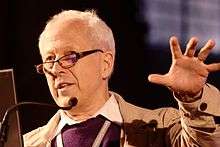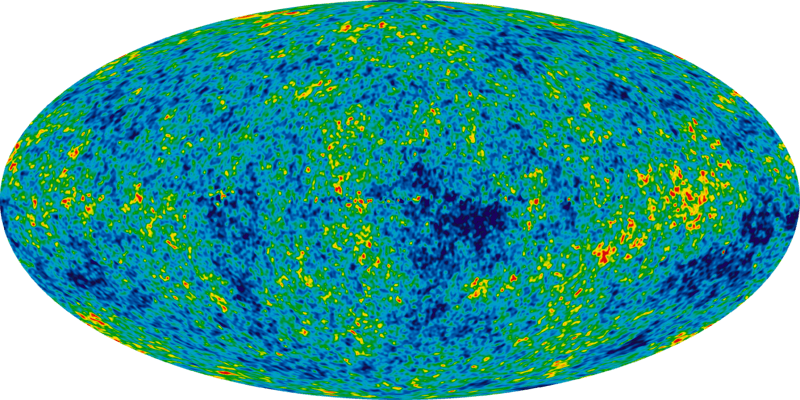George F. R. Ellis
| George F R Ellis | |
|---|---|
 George Francis Rayner Ellis | |
| Born |
11 August 1939 Johannesburg, South Africa |
| Residence | South Africa |
| Nationality | South African |
| Education | Michaelhouse |
| Alma mater |
University of Cape Town University of Cambridge University of Cape Town |
| Known for | Theoretical physical cosmology |
| Awards | Templeton Prize 2004 |
| Scientific career | |
| Fields | Cosmology |
| Institutions |
University of Cambridge SISSA |
| Doctoral advisor | Dennis W. Sciama |
| Part of a series on | ||||
| Physical cosmology | ||||
|---|---|---|---|---|
 | ||||
|
Early universe
|
||||
|
Components · Structure
|
||||
| ||||
George Francis Rayner Ellis, FRS, Hon. FRSSAf (born 11 August 1939), is the emeritus distinguished professor of complex systems in the Department of Mathematics and Applied Mathematics at the University of Cape Town in South Africa. He co-authored The Large Scale Structure of Space-Time with University of Cambridge physicist Stephen Hawking, published in 1973, and is considered one of the world's leading theorists in cosmology.[1] He is an active Quaker and in 2004 he won the Templeton Prize.[2] From 1989 to 1992 he served as president of the International Society on General Relativity and Gravitation. He is a past president of the International Society for Science and Religion. He is an A-rated researcher with the NRF.
Ellis was a vocal opponent of apartheid during the National Party reign in the 1970s and 1980s, and it is during this period that Ellis's research has focused on the more philosophical aspects of cosmology, for which he won the Templeton Prize. He was also awarded the Order of the Star of South Africa by Nelson Mandela, in 1999. On 18 May 2007, he was elected a fellow of the British Royal Society.
In 2005 Ellis appeared as a guest speaker at the Nobel Conference in St. Peter, Minnesota.
Life
Born in 1939 to George Rayner Ellis, a newspaper editor, and Gwendoline Hilda MacRobert Ellis in Johannesburg, George Francis Rayner Ellis attended the University of Cape Town, where he graduated with honours in 1960 with a Bachelor of Science degree in physics with distinction. He represented the university in fencing, rowing and flying.
While a student at Cambridge University, where he received a PhD in applied maths and theoretical physics in 1964, he was on college rowing teams.
At Cambridge, Ellis served as a research fellow from 1965 to 1967, was assistant lecturer in the Department of Applied Mathematics and Theoretical Physics until 1970, and was then appointed university lecturer, serving until 1974.
Ellis became a visiting professor at the Enrico Fermi Institute at the University of Chicago in 1970, a lecturer at the Cargese Summer School in Corsica in 1971 and the Erice Summer School in Sicily in 1972, and a visiting H3 professor at the University of Hamburg, also in 1972.
The following year, Ellis co-wrote The Large Scale Structure of Space-Time with Stephen Hawking, debuting at a strategic moment in the development of General Relativity Theory.
In the following year, Ellis returned to South Africa to accept an appointment as professor of applied mathematics at the University of Cape Town, a position he held until his retirement in 2005.
Work
George Ellis has worked for many decades on anisotropic cosmologies (Bianchi models) and inhomogeneous universes, and on the philosophy of cosmology.[3] He is currently writing on the emergence of complexity, and the way this is enabled by top-down causation in the hierarchy of complexity.[4]
In terms of philosophy of science, Ellis is a Platonist.[5]
Publications
Books
- (with Stephen Hawking): Hawking, S.W.; Ellis, G.F.R. (1973). The Large Scale Structure of Space-Time. Cambridge: Cambridge University Press. ISBN 0-521-20016-4. [6]
- (with David Dewar): Low Income Housing Policy in South Africa, Urban Problems Research Unit, UCT, 1979.
- (with Ruth Williams): Flat and Curved Space Times, Oxford University Press, 1988, revised 2000.
- Before the Beginning: Cosmology Explained, Bowerdean/Marion Boyars, 1993.
- (with A. Lanza and J. Miller): The Renaissance of General Relativity and Cosmology. University Press, Cambridge 1993; paperback, 2005.
- Science Research Policy in South Africa, Royal Society of South Africa, 1994.
- (with Nancey Murphy): On The Moral Nature of the universe: Cosmology, Theology, and Ethics. Fortress Press, 1996.
- (with John Wainwright, Eds.): Wainwright, J.; Ellis, G.F.R., eds. (1997). Dynamical Systems in Cosmology. Cambridge: Cambridge University Press. ISBN 0-521-55457-8.
- (with Peter Coles): Is The Universe Open or Closed? The Density of Matter in the Universe. Cambridge University Press, 1997.
- (Ed.): The Far Future Universe, Templeton Foundation Press, 2002.
- Science in Faith and Hope: an interaction, Quaker Books, 2004.
- (with Roy Maartens and Malcolm A. H. MacCallum): Relativistic Cosmology, Cambridge University Press, 2012.
- "How Can Physics Underlie the Mind? Top-Down Causation in the Human Context", Springer, 2016
Papers
Ellis has over 500 published articles (See "" here for top cited papers) including 17 in Nature. Notable papers include:
- "Covariant and Gauge Invariant Approach to Cosmological Density Fluctuations" [Phys. Rev. D 40 (1989) 1804-1818] (with Marco Bruni)
- "Schwarzschild black hole lensing" [Phys. Rev. D 62084003, (2000)] (with K. S. Virbhadra)
- "arXiv:gr-qc/9812046v5 Cosmological models" (Cargèse Lectures 1998) (with Henk van Elst)
- "Gravitational lensing by naked singularities" [Phys. Rev. D 65 103004, (2002)] (with K. S. Virbhadra)
- "Cosmological perturbations and the physical meaning of gauge-invariant variables" (with Marco Bruni, Peter K. S. Dunsby) The Astrophysical Journal, volume 395 (1992)
- "The case for an open Universe" in Nature 370, 609–615 (25 August 1994)
- "Physics, complexity and causality" in Nature 435, p. 743 (9 June 2005)
- "Is the Universe Expanding?", General Relativity and Gravitation, Vol. 9, Issue 2, pp. 87-94 (February 1978)
See also
Notes and references
- ↑ Gibbs, W.W. (1995) Profile: George F. R. Ellis – Thinking Globally Acting Universally, Scientific American 273(4), 50-55.
- ↑ Templeton Prize for Progress Toward Research or Discoveries about Spiritual Realities
- ↑ Ellis, George (2006). Handbook in Philosophy of Physics. Elsevier. pp. 1183–1285. ISBN 0-444-53002-9.
- ↑ Ellis, George (6 February 2012). "Top down causation and emergence: some comments on mechanisms". Royal Society Interface Focus. 2 (2): 126–140.
- ↑ Ellis, George (2004). Science and Ultimate Reality: Quantum Theory, Cosmology and Complexity. Cambridge: Cambridge University Press. pp. 607–636. ISBN 0-521-83113-X.
- ↑ Markus, Lawrence (1976). "Review of The large scale structure of space-time by S. W. Hawking and G. F. R. Ellis". Bull. Amer. Math. Soc. 82: 805–817. doi:10.1090/S0002-9904-1976-14169-9.
External links
- George Ellis's web page
- Professor George Ellis: a man of many parts, Cape Argus, 18 March 2004
- George Ellis's scientific work as listed at SPIRES
- Interview with George Ellis (Recorded June 2004) [dead link] on Speaking of Faith with Krista Tippett (transcript)
- George Ellis extended interview with transcript for the 'Why Are We Here?' documentary series.